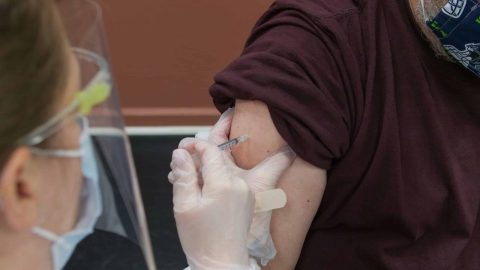If you ask around in your own circle of acquaintances, you will find that the vaccination coverage rate is now significant. In Austria, it seems, everyone who really wants a vaccination has already received at least a partial vaccination – regardless of prioritization, age or medical history. The EU vaccination rate lags about 6 weeks behind the U.S., 9 weeks behind the U.K., and 12 weeks behind Israel. From a European perspective, this allows a preview of the challenges ahead.
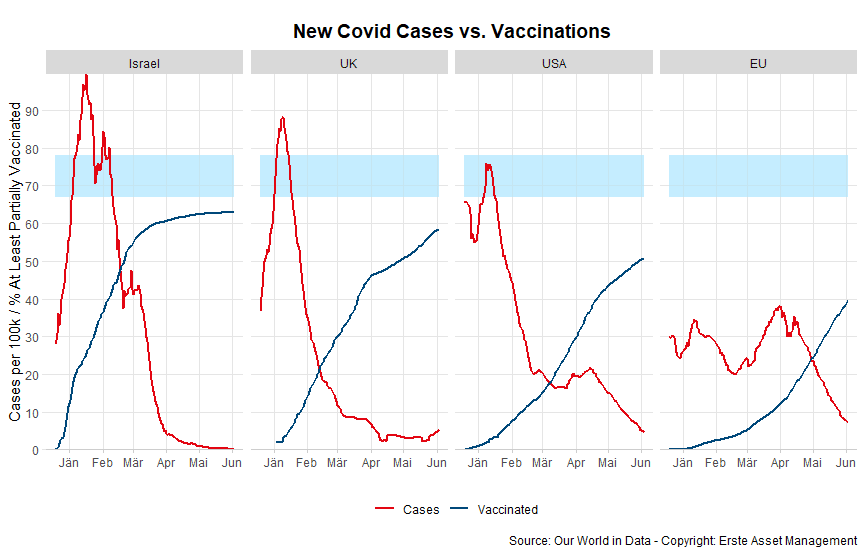
Israel, as a pioneer, has shown that new infections can be brought largely under control with a proportion of at least 50% of the population at least partially vaccinated. But even Israel is still a long way from reaching the critical threshold of 65-75% immunization. Above this immunization rate, experts assume herd immunity. Although the infection incidence at an immunization rate of 70% will not differ significantly from that at an immunization rate of 50%, reaching the threshold is essential to prevent the emergence of vaccine-resistant virus variants.
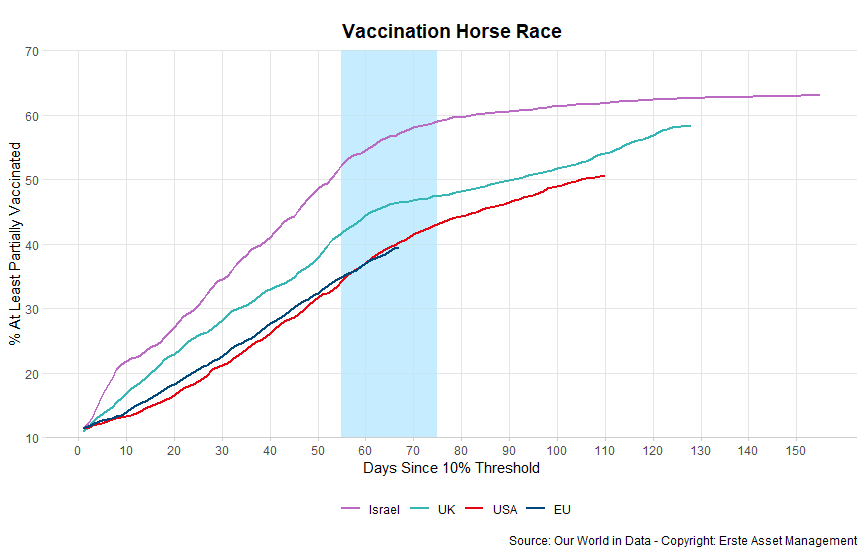
In an international comparison, vaccination progress in the EU follows that of the USA almost exactly, with a 6-week delay. Israel and the UK were able to achieve faster progress due to initially larger vaccine quotas and different vaccination strategies (the UK started with almost exclusively partial vaccinations and a longer interval to the second vaccination). The graph above compares the vaccination progress in the days after reaching the 10% partial vaccination threshold. Most recently, vaccination progress in Israel has come to a virtual standstill, due to a payment dispute with the main supplier, Pfizer, on the one hand, and the declining willingness of the population to be vaccinated on the other.
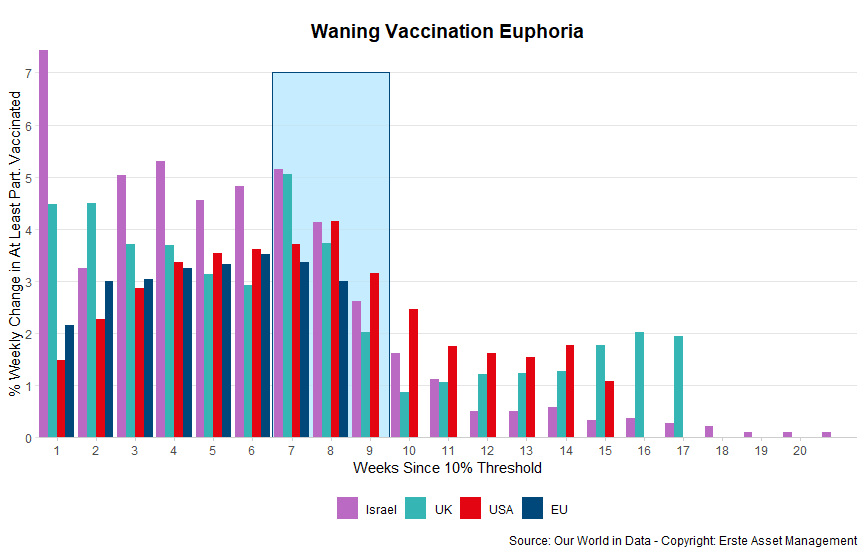
In all countries that are ahead of the EU in vaccination, a striking reduction in weekly vaccinations was seen 7 to 9 weeks after the 10% partial vaccination threshold was reached. The EU member states are currently in this transition phase and the explanation is obvious – vaccination skepticism. The University of Vienna measures the willingness of the population to be vaccinated at regular intervals and was able to establish in April that in Austria, in addition to the 22% who have already been at least partially vaccinated, the group of those willing to be vaccinated with 37% of the population is faced by 36% vaccination skeptics or opponents. In addition, the age group 0-10, which represents about 10% of the population in Austria, cannot be vaccinated in the foreseeable future. This would mean, ceteris paribus, that only 60% of the population in Austria can be vaccinated voluntarily.
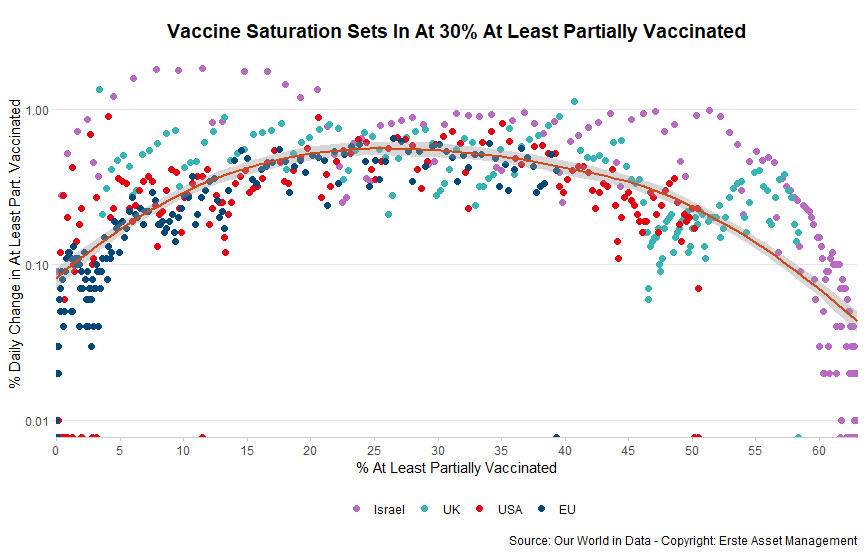
Internationally, it is becoming increasingly difficult to find takers for vaccine doses if the proportion of partially vaccinated people exceeds 30%. In the USA, vaccination lotteries have been launched in many places, offering all vaccinated persons the chance to win considerable amounts of money. This is intended to combat the increasing vaccination fatigue. At least anecdotally, there seems to be evidence of positive effects of such measures. However, information campaigns and tying citizenship privileges to vaccination status seem to be the more effective way forward. In the United Kingdom, full participation in public life is available only to those who are more vaccinated or tested. However, vaccination readiness in the United Kingdom has been and continues to be very high by European standards, as reflected in continuously good vaccination progress.
Conclusion
Although many citizens in Europe are still waiting for their first shot, we are already in the midst of the transition from the vaccine shortage phase to the vaccination willingness shortage phase. Especially for countries with large numbers of vaccine skeptics, such as France or Italy, achieving herd immunity will be a major political and societal challenge. Even if the end of the pandemic seems within reach for citizens as well as politicians due to the rapidly decreasing number of cases, full vaccination coverage must be strived for. Otherwise, it is only a matter of time before a vaccine-resistant virus mutant becomes established. Vaccine manufacturing capacity has been massively expanded and at least the developed world can be rapidly vaccinated against new mutants via boosters already ordered for the following years. However, a renewed flare-up of the pandemic in the rest of the world may have strong negative consequences on the economic recovery in supposedly protected countries.
Legal note:
Prognoses are no reliable indicator for future performance.
Legal disclaimer
This document is an advertisement. Unless indicated otherwise, source: Erste Asset Management GmbH. The language of communication of the sales offices is German and the languages of communication of the Management Company also include English.
The prospectus for UCITS funds (including any amendments) is prepared and published in accordance with the provisions of the InvFG 2011 as amended. Information for Investors pursuant to § 21 AIFMG is prepared for the alternative investment funds (AIF) administered by Erste Asset Management GmbH pursuant to the provisions of the AIFMG in conjunction with the InvFG 2011.
The currently valid versions of the prospectus, the Information for Investors pursuant to § 21 AIFMG, and the key information document can be found on the website www.erste-am.com under “Mandatory publications” and can be obtained free of charge by interested investors at the offices of the Management Company and at the offices of the depositary bank. The exact date of the most recent publication of the prospectus, the languages in which the fund prospectus or the Information for Investors pursuant to Art 21 AIFMG and the key information document are available, and any other locations where the documents can be obtained are indicated on the website www.erste-am.com. A summary of the investor rights is available in German and English on the website www.erste-am.com/investor-rights and can also be obtained from the Management Company.
The Management Company can decide to suspend the provisions it has taken for the sale of unit certificates in other countries in accordance with the regulatory requirements.
Note: You are about to purchase a product that may be difficult to understand. We recommend that you read the indicated fund documents before making an investment decision. In addition to the locations listed above, you can obtain these documents free of charge at the offices of the referring Sparkassen bank and the offices of Erste Bank der oesterreichischen Sparkassen AG. You can also access these documents electronically at www.erste-am.com.
Our analyses and conclusions are general in nature and do not take into account the individual characteristics of our investors in terms of earnings, taxation, experience and knowledge, investment objective, financial position, capacity for loss, and risk tolerance. Past performance is not a reliable indicator of the future performance of a fund.
Please note: Investments in securities entail risks in addition to the opportunities presented here. The value of units and their earnings can rise and fall. Changes in exchange rates can also have a positive or negative effect on the value of an investment. For this reason, you may receive less than your originally invested amount when you redeem your units. Persons who are interested in purchasing units in investment funds are advised to read the current fund prospectus(es) and the Information for Investors pursuant to § 21 AIFMG, especially the risk notices they contain, before making an investment decision. If the fund currency is different than the investor’s home currency, changes in the relevant exchange rate can positively or negatively influence the value of the investment and the amount of the costs associated with the fund in the home currency.
We are not permitted to directly or indirectly offer, sell, transfer, or deliver this financial product to natural or legal persons whose place of residence or domicile is located in a country where this is legally prohibited. In this case, we may not provide any product information, either.
Please consult the corresponding information in the fund prospectus and the Information for Investors pursuant to § 21 AIFMG for restrictions on the sale of the fund to American or Russian citizens.
It is expressly noted that this communication does not provide any investment recommendations, but only expresses our current market assessment. Thus, this communication is not a substitute for investment advice.
This document does not represent a sales activity of the Management Company and therefore may not be construed as an offer for the purchase or sale of financial or investment instruments.
Erste Asset Management GmbH is affiliated with the Erste Bank and austrian Sparkassen banks.
Please also read the “Information about us and our securities services” published by your bank.
